In the marketing space, augmented reality enables businesses to provide distinctive and engaging digital experiences as well as memorable consumer engagement.

Reality Marketing specializes in supporting businesses in achieving the full potential of augmented reality, from concept through execution and beyond.
The global market for virtual reality, augmented reality, & mixed reality is predicted to grow by more than 220 billion U.s. dollars between 2021 and 2028. According to Apple CEO Tim Cook, AR will eventually become as essential to our daily lives as “eating three meals a day.”
AR has also penetrated a variety of sectors, including marketing. In reality, a lot of people utilize branded AR experiences every day without being aware of them, such as the image and video effects on social media.
This post examines 9 businesses that have utilized augmented reality (AR) in creative and motivating ways. If you’re curious about how AR relates to marketing, you can use this information to develop and implement your own plan.
9 Creative & Inspirational Augmented Reality Marketing Examples
1. Machine A – virtual concept store
Machine-A is a concept store in London that focuses on presenting current fashion design. Machine-A developed a plan to allow as many viewers as possible to witness the work of up-and-coming designers in light of the fact that the current year’s London Fashion Week will either cancelled or restricted to internet shows.
The concept was a virtual boutique that attempted to “add an immersive twist to a digital season of performances, bridging the void between IRL and URL,” according to ShowStudio.
2. Pokémon GO – Virtual Pokemon Finder
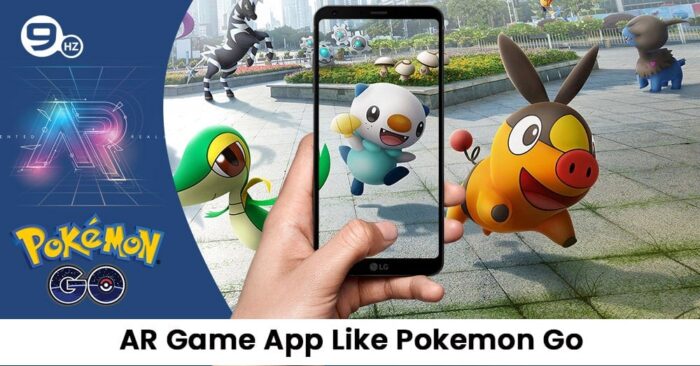
Pokemon GO, one of the most renowned AR experiences, grabbed the globe by storm in 2016.
Users of the app are notified about qualified Pokémon nearby and given instructions on how to locate and capture them. The Pokémon character is placed over the app user’s actual location when users come across one, creating an augmented reality (AR) experience.
When the app was launched, players would congregate in teams in an attempt to be the initial group to capture the available nearby Pokémon because the game was based on catching them before anyone else can.
3. Gucci – virtual sneakers
Rolling up the door to the #GucciSneakerGarage, a new destination on the Gucci App, features a mix of storytelling, gaming, and a virtual gallery of #Gucci sneakers recreated by a mix of talents, discover more https://t.co/pYjWc7irwm. pic.twitter.com/Ir0lnZkaSf
— gucci (@gucci) November 1, 2020
One of the primary reasons retail businesses have invested in augmented reality technology is to assist customers in making more educated purchasing selections. The first premium firms to accomplish this was Gucci, which allowed customers to “try on” sneakers using an augmented reality feature in their smartphone.
This is a very useful application of augmented reality for the retail industry; the technology has the potential to decrease returns and increase customer happiness by providing customers with a visual picture of how a thing would appear in real life.
Gucci recently unveiled a set of virtual sneakers that are exclusively meant to be shared and worn online.
4. IKEA Studio app
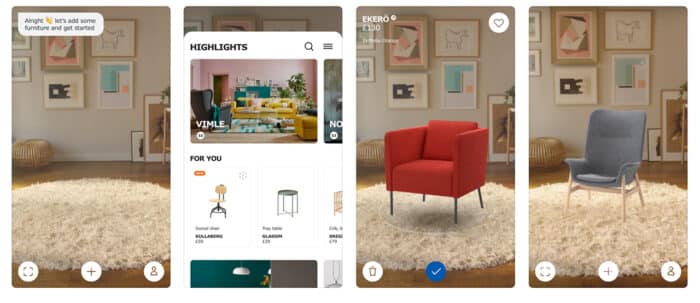
Before making a purchase, IKEA offers customers augmented reality (AR) tools to test and view things in their own homes.
It provides a variety of tools to meet the needs of its customers, such as the IKEA Place app, which provides visual to-scale furniture models on actual rooms, and the IKEA Home Planner, which helps people construct furniture sets, such as kitchen cupboards, to ensure they are satisfied once placing an order.
Users of the Ikea Place application may virtually arrange furniture in a space. The brand-new Ikea Studio software allows users to capture and redesign whole 3D room blueprints, including everything from window frames, door frames, and wall colors and rugs, using iPhones’ LiDAR sensors.
5. Amazon – hair colouring at Amazon Salon
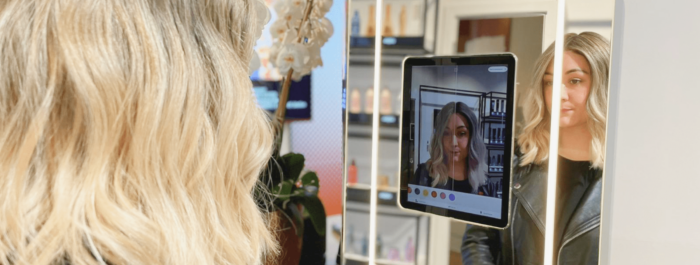
The first brick-and-mortar hair salon owned by the e-commerce behemoth, Amazon Salon, was created in part as a test bed for emerging retail technology. One example is “Point and Learn,” which, according to Amazon, enables users to “customers can simply point at the product they are interested in on a display shelf and the relevant information, including brand videos and educational content, will appear on a display screen.”
Customers may scan the appropriate QR code on the store to visit the product description on the online store, where they can then purchase the items.
Customers can try different hair colours utilising AR technology in relation to this tool, before physically getting their hair styled.
6. Pull & Bear – video game
‘Pacific Game,’ an augmented reality game developed in conjunction with Facebook’s ‘Creative Shop,’ has been released by Inditex, the founder of the retail company Pull & Bear. Users move their heads while playing the game to avoid obstacles and gather points as they travel virtually from California to Tokyo.
The game, which was primarily created for social media, could be played on Facebook, Instagram, and the retailer’s own website. Users may experiment with Instagram’s front camera function particularly.
7. Netflix – Stranger Things Experience
Netflix launched the Stranger Things Experience, an in-person interactive marketing and augmented reality event, to promote season four of Stranger Things. Fans visit a physical site and take part in a unique 3d experience that is relevant to the show by playing games using augmented reality (AR) capabilities that transfer them to the Stranger Things world.
Previous seasons of Stranger Things have been promoted by Netflix using augmented reality (AR) features like Instagram filters that immerse consumers in the universe as they watch from the comfort of their own homes.
8. Wayfair – ‘View in Room’
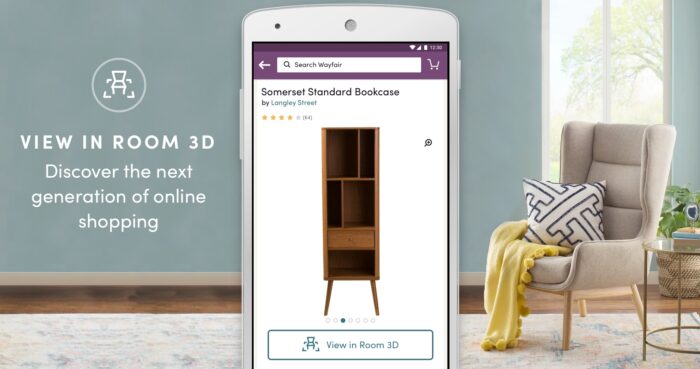
Not just Ikea but other furniture stores have made significant investments in augmented reality. Wayfair announced the launch of an improved version of its “See in Room” app in September 2020, combining “enhanced utility and heightened delight when shopping for products for the home.” with the help of LiDAR technology.
LiDAR and RealityKit have been combined by Wayfair to provide customers with a more accurate and authentic experience. For instance, users may examine items cast in appropriate lighting (based on real-time). The new version also gives users the option to stack goods and appear in front of them as they would in the actual world, thereby personalizing the experience.
9. StubHub – visualise the stadium
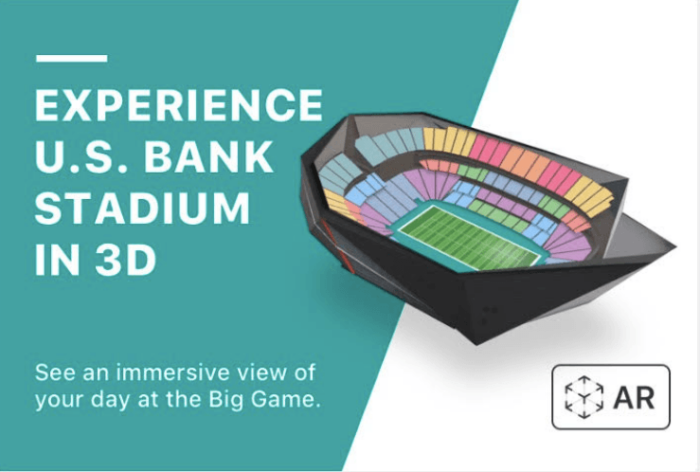
Augmented reality allows you to experience and communicate with a space, which is both important aspects when deciding how much to spend for a stadium ticket.
When Super Bowl LII tickets went on sale, StubHub added an augmented reality (AR) feature to their mobile app that let users view a realistic “3D model of the U.S. Bank Stadium” as well as neighboring parking lots and concession booths. This reduced the probability of paying for a substandard seat and allowed potential customers to picture their entire experience before making a purchase.
StubHub’s dependence on augmented reality (AR) resolved a typical consumer issue. The opportunity to realistically evaluate several seat positions for visitors from out of town gives reluctant customers more confidence.
The Role of AR in Marketing in the Future
The popularity of augmented reality experiences is rising, and for good reason. They foster communities while offering a fun and interesting experience. Customers may effortlessly introduce their friends & network to the AR experience by using social media. In order to close the gap between both the digital and real worlds, marketing experts and company managers are encouraged to invest in Augmented reality technology by the shareability factor, which plays a vital role in the growth of the AR sector.
Whether it’s an app or a website, augmented reality opens up new possibilities for brand storytelling.Your company can benefit greatly from implementing augmented reality in marketing. Companies that choose to ignore it will undoubtedly suffer significant difficulties and significant losses. Marketing Mind specializes in supporting businesses in achieving the full potential of augmented reality, from concept through execution and beyond.















